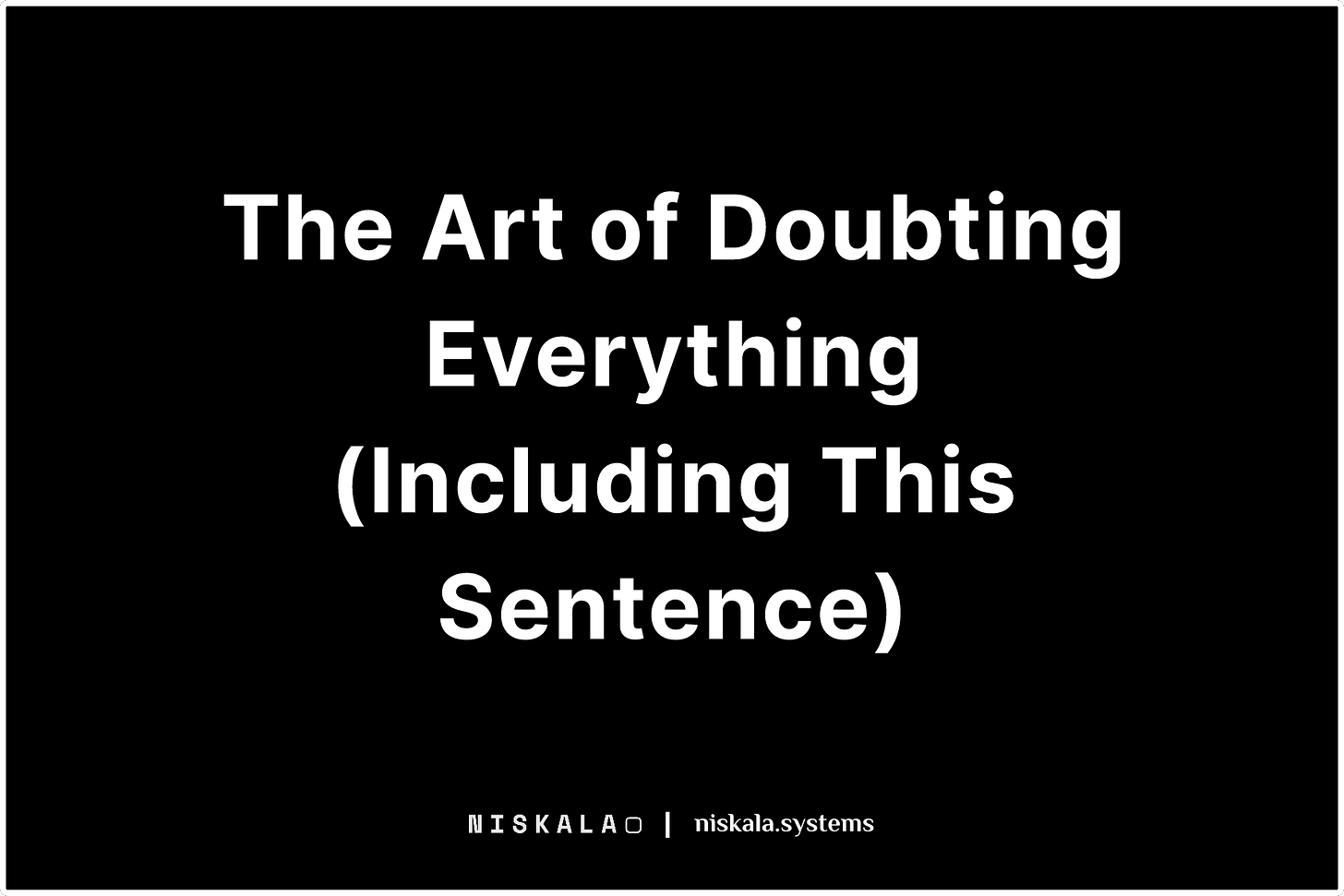Trust No One. Not Even Yourself.
Your brain's greatest trick? Convincing you it's not lying
The Fundamental Paradox of Trust
Trust is the glue of society — until it becomes the solvent. We’re wired to believe: in our memories, our judgments, the version of reality our brains serve us daily. But here’s the rub: your mind edits reality like a Hollywood director. It cuts boring scenes, enhances dramatic moments, and adds soundtracks to fit your personal narrative. Studies show we rewrite memories within hours of forming them, yet swear under oath they’re unaltered footage.
The first rule of cognitive security? Treat your own thoughts as potential disinformation.
That voice insisting “I’d never fall for propaganda”? That’s propaganda.
The certainty that you’re seeing things objectively? That’s the delusion talking.
Start by mapping your mental blind spots:
Confidence traps: The more certain you feel, the harder to spot manipulation (including your own)
Emotional bookkeeping: Anger, fear, or excitement can override your internal fact-checkers
Narrative inertia: Your brain prefers coherent stories over messy truths
Case in point: Ever replayed an argument, editing your responses to sound wittier? That’s not harmless daydreaming — it’s your mind rewriting history to protect your ego. Now scale that to every decision you make. Scary, right?
The Mirror Paradox: Why Self-Awareness Fails
“Know thyself” sounds great on motivational posters. In practice? Self-awareness is a hall of mirrors. Research reveals that people who rate themselves as highly self-aware are often the least accurate in actual assessments. You can’t clean a window while breathing on it — your very attempt to observe alters what’s observed.
This creates three fatal flaws:
The Introspection Illusion: We assume deep reflection = truth, but overthinking often manufactures false clarity
The Bias Blind Spot: Easily spot others’ cognitive errors while missing identical flaws in yourself
The Certainty Trap: Mistaking strong emotions for evidence (“I feel sure, therefore I’m right”)
Try this: Next time you’re certain about someone’s motives, ask: “What evidence would make me question this?” If your brain can’t produce credible alternatives, you’re not thinking — you’re rationalizing.
Building Cognitive Antibodies
Your mind needs an immune system. Just as antibodies patrol for pathogens, you need mental protocols to detect self-deception. Start with these:
1. Red-Team Your Brain
Assign a mental “devil’s advocate” to attack your convictions. If you believe “I’m a great judge of character,” force yourself to list three times you were catastrophically wrong.
2. The 24-Hour Rule
Before acting on strong convictions, sleep on them. Emotions decay faster than logic. What feels urgent at midnight often looks ridiculous at noon.
3. Third-Person Perspective
Reframe decisions as if advising a friend. We’re kinder (and wiser) when assessing others’ problems vs. our own.
4. The Discomfort Meter
Track physical reactions. Sweaty palms or tight shoulders when contemplating a choice? Your body might know something your mind won’t admit.
The Doctrine of Strategic Distrust
Healthy skepticism isn’t cynicism — it’s hygiene. Apply these filters to everything (yes, everything):
Source Criticism: Who benefits from you believing this? (Including you)
Motivation Audits: Are you clinging to this idea because it’s true, or because it’s comfortable?
Failure Forecasting: Imagine this belief leads to disaster. What vulnerabilities does that expose?
Example: You “trust” a colleague. But is that trust based on their consistent actions, or your need to avoid workplace tension? Map the difference.
The Art of Strategic Naivety
Here’s the twist: Total distrust is just another cage. The goal isn’t paranoia — it’s precision. Build “airlocks” in your mind:
Temporary Trust Zones: Grant limited, revocable confidence to ideas/people — like a burner phone for relationships
The 51% Rule: Act when evidence slightly favors action, but maintain capacity to abort
Falsehood Fertilizer: Let outdated beliefs die so better ones can grow. As Nietzsche said, “Sometimes you need to lose your mind to come to your senses.”
Your brain’s imperfections aren’t flaws — they’re features. By learning to doubt skillfully, you transform vulnerability into power. The final test? Read this again in a week. See what you’ve already rewritten in your mind. Now go forth — and may your doubts be ever in your favor.



